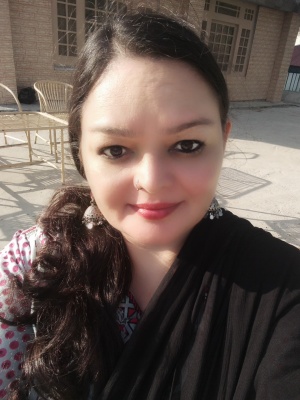Tackling Real Issues affecting the People
Qudsia Mahtab Mehmood
Islamabad, Pakistan
Development Journalist
What type of projects do you do?
I produce radio and television programs that tackle gender-based violence, and pressing issues affecting children and other marginalized groups. I also provide gender-sensitivity training for students and journalists. I have also designed and developed communication strategies for national-level government and donor-funded projects. Recently I have worked on educating communities about pro-women laws.
Why did this sort work interest you, and how did you get started?
Working with media has always been my passion. This pushed me to maximize its powers in amplifying the voices of women, children and marginalized groups, providing me with a sense of satisfaction that my work contributes towards genuine development for the people.
What part of this job do you like and find most satisfying?
I believe that solutions to the problems confronting communities can rise among their ranks. We work hard to ensure that it is people’s voice – their stories and narratives – that is aired. This includes traveling to communities near and far to get the stories straight from them, making our work even more meaningful.
What do you not like or find most challenging about working in this industry?
Development journalism is yet to be recognized in Pakistan. Such a branch of journalism entails investigative reporting that tackles real issues affecting the people. The challenge, however, is to sell these reports.
My strongest assets/skills, areas of knowledge, personality traits and values are….
I am truly blessed to have worked the way I wanted to, secure all the required trainings, and hone skills to get the work done. One of my strongest assets is courage and a deep understanding of issues rooted in our culture. I am an independent traveler and have worked in the most fragile environments in Pakistan.
Has IAWRT’s network of media women around the world helped or inspired you?
Whenever I face challenges, it comforts me that there are women in media around the world who are working in more sensitive places, under more dire circumstances, and facing all kinds of threats. As such, I know that not only can I relate to other women media but also get support from the group.
What are your long-term goals?
I don’t make long-term goals. I would rather focus on my efforts in making more aware and empowered communities.
What special advice do you have for other women seeking this type of work?
I have witnessed girls graduating with a degree in mass communication but are not pursuing it as a career. I encourage them to come forward and explore this field of work. There is a lot of work waiting to be done to make this society truly gender sensitive. We need more empowered voices in the media.
Do you have any special words of warning, or encouragement, based on your experience?
Learning is both key and a life-long process. Our contribution may not change the society at once. But at the end of it, every contribution counts.
Links to some of Qudsia’s work online:
Cholistan Pakistan-Where water is life and no water,no life.
Trafficking of Women, Heart Breaking Reality
Personal website/profiles online








